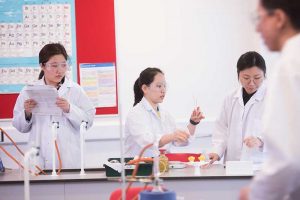Biochemistry
The Biochemistry Foundation Programme (BFP) is a one-year intensive course, designed as an alternative to A Levels, which prepares students for undergraduate study for a range of science courses at university. The BFP is accredited by the NCFE. Students can progress to a variety of university courses such as chemistry, biochemistry, pharmacology, biomedical science or pharmacy (subject to passing with the appropriate percentage and impressing at the universities’ interview). The entry requirements is to achieve an IELTS 6.0 (evidenced by official certification) prior to commencement of the programme.
Which students is it recommended for?
- Most of the students on the BFP course have an international background. They may have great educational achievements in their own countries but unfortunately do not meet the UK university entrance qualifications.
Course Structure
The course has two components: biology and chemistry. The subject weightings are shown below.
| Biology | Chemistry | |
| Biochemistry IFP | 50% | 50% |
All BFP courses are 100% assessed by examinations held in January and June each year. There are 2 exams to be sat in biology and 2 in chemistry.
| Biology | Chemistry | |
| January Exams | Biology 1 | Chemistry 1 |
| June Exams | Biology 2 | Chemistry 2 |
The percentages from each subject are added together to produce an overall grade:
> 90% A*A*
80-90% : A*A
75-79% : AA
70-74% : AB
60-69% : BB
50-59% : BC
40-49% : CC
(This is only a guideline and subject to change for each exam series).
All BFP pathways include English Language tuition to prepare students for the IELTS examinations if needed. This ensures that all BFP students meet university English Language entry requirements. Students also receive lessons in Personal Development, which aim to develop students’ writing and presentation skills. On average, students have approximately 16 hours of lessons per week, and are expected to supplement this with at least 10 hours of independen
BIOLOGY DESCRIPTORS
THE FOUNDATIONS OF BIOLOGY
This unit introduces the biochemical basis of living organisms, their cellular nature and how cells arise from other cells. It also considers the organs and mechanisms involved in human gas exchange, digestion and blood circulation. Compulsory practicals enable students to appreciate scientific methods and develop competence in handling apparatus.
1. Biological Molecules
2. Enzymes
3. Cell Structure
4. Biological Membranes
5. Communicable Diseases, Disease Prevention & The Immune System
6. Exchange Surfaces
7. Digestion & Absorption
8. Transport in Animals
9. Respirationt study.
CHEMISTRY DESCRIPTORS
THE FOUNDATIONS OF CHEMISTRY
Students will learn the key thinking that underpins all chemistry. They will develop their quantitative skills and use their knowledge to relate macroscopic properties to the structure and bonding. They will also look at organic molecules and start to analyse the mechanism by which reactions occur. Relevant practical skills will be developed.
1. Development of Practical Skills
2. Atoms, Ions and Compounds
3. Amount of Substance
4. Acids & Redox
5. Electrons & Bonding
6. Shapes of Molecules & Intermolecular Forces
7. Periodicity
8. Reactivity Trends (Group 2 & Group 7)
9. Enthalpy Changes
10. Rates of Reaction & Equilibrium
11. Basic Concepts Organic Chemistry
12. Alkanes
13. Alkenes
14. Alcohols
15. Haloalkanes
16. Organic Synthesis
17. Spectroscopy (Infrared and Mass Spectroscopy)
NATURE AND NURTURE
This unit introduces more complex biochemical and physiological processes. More challenging topics are covered, including homeostasis and genetics. The mechanism and uses of gene manipulation and biotechnology are studied.
10. Communication & Homeostasis
11. Excretion as an Example of Homeostatic Control
12. Neuronal Communication
13. Animal Responses
14. Hormonal Communication
15. Nucleotides & Nucleic Acids
16. Cell Division (Mitosis)
17. Cell Division (Meiosis), Cell Diversity & Cellular Organisation
18. Classification & Evolution
19. Patterns of Inheritance
20. Cellular Control
21. Manipulating Genomes
22. Cloning & Biotechnology
THE APPLICATIONS OF CHEMISTRY
Students will learn more about the ways in which we can control and understand reactions, both qualitatively and quantitatively. The organic work is developed and introduces more mechanisms and ideas that have a huge impact on biochemistry and drug synthesis. Relevant practical skills will be developed.
18. Rates of Reaction
19. Equilibrium
20. Acids, Bases & pH
21. Buffers & Neutralisation
22. Enthalpy & Entropy
23. Redox & Electrode Potentials
24. Aromatic Chemistry
25. Carbonyls & Carboxylic Acids
26. Amines, Amino Acids & Polymers
27. Spectroscopy (13C and 1H NMR)




